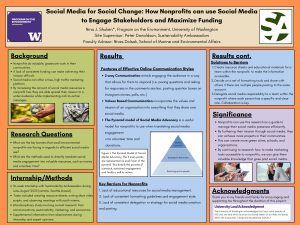SOCIAL MEDIA FOR SOCIAL CHANGE: HOW NONPROFITS CAN USE SOCIAL MEDIA TO INCREASE STAKEHOLDER COMMUNICATIONS AND GAIN FUNDING
Small environmental nonprofits do critical work in communities. Their efforts account for copious amounts of grassroots-level sustainable environmental action. Many nonprofits struggle with the same problem – funding. The purpose of this study was to examine how small environmental nonprofits can utilize social media efficiently when communicating their mission to stakeholders. It also aims to answer how this utilization of social media can lead to increased communication with stakeholders, and subsequently an increase in funding. In order to answer these questions, a multi- discipline study was conducted, spanning sustainability, marketing, communications, and economics. By compiling the most relevant research from across the fields, as well as observing and talking to experts, this study was able to put forth a set of resources and guidelines that small environmental nonprofits can use to boost their social media presence. It was determined that delegation (forming a specific group for this need and assigning them jobs and responsibilities) would be an incredibly important tool, as the resources of small environmental nonprofits do not usually lend themselves to hiring marketing or social media managers. In addition to this, communication skills such as 2-way and values-based communication would increase the likelihood of stakeholders wanting to continue engaging with the mission of these nonprofits. By incorporating several fields of research, this study was able to compile the most efficient ways for small environmental nonprofits to be an active and present part of the community, while continuing to gain the resources that are necessary for their work.
